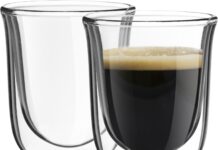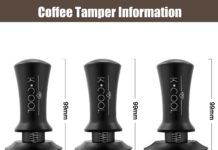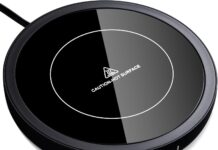Coffee lovers rejoice! We have great news for you – reusable coffee filters are here to revolutionize your brewing experience while also helping the environment. In this article, we will explore the benefits of using reusable coffee filters, from reducing waste to enhancing the flavor of your favorite brew. Join us as we delve into the world of eco-friendly brewing and discover how these filters can make a positive impact on both your coffee routine and the planet. So grab your mug and let’s start brewing sustainably!
Benefits of Using Reusable Coffee Filters
Reusable coffee filters offer several benefits that make them a great choice for eco-friendly brewing. Here are the top advantages:
Reduced Waste
One of the primary benefits of using reusable coffee filters is the significant reduction in waste compared to disposable paper filters. With disposable filters, each cup of coffee generates a piece of waste that ends up in landfills. By switching to reusable filters, we can help minimize our environmental footprint and contribute to a more sustainable world.
Cost Savings
Using reusable coffee filters can also lead to substantial cost savings in the long run. While the initial investment may be higher compared to disposable filters, the reusable filters can be used for an extended period. This eliminates the need for continuously purchasing disposable filters, which can quickly add up in terms of expenses.
Versatility
Reusable coffee filters are versatile and can accommodate a variety of brewing methods and coffee makers. Whether you prefer a drip coffee maker, pour-over, French press, or espresso machine, there is likely a reusable filter option available for your specific needs. This versatility allows us to experiment with different brewing techniques and enjoy a customized coffee experience.
Different Types of Reusable Coffee Filters
There are various types of reusable coffee filters available in the market. Each type has its unique characteristics and advantages. Let’s explore the most common types:
Metal Filters
Metal filters, often made of stainless steel or gold-tone, are known for their durability and long lifespan. These filters have fine mesh screens that allow the natural oils and flavors from the coffee beans to pass through while trapping the coffee grounds. Metal filters are popular among coffee enthusiasts who appreciate a rich and robust brew.
Cloth Filters
Cloth filters, typically made of cotton or hemp, offer a more environmentally friendly alternative to paper filters. These filters are porous and allow the coffee oils to seep through, resulting in a flavorful cup of coffee. Cloth filters require regular cleaning and sterilization to prevent any buildup of residue and maintain their effectiveness.
Paper Filters with Metal Filters
For those who prefer the convenience of paper filters but still want the sustainability of reusable filters, there are options available that combine both. These filters consist of a metal frame with a paper filter insert. The metal frame can be reused, while the paper insert can be composted after use. This hybrid design provides the benefits of both paper and reusable filters.
How to Choose the Right Reusable Coffee Filter
When selecting a reusable coffee filter, there are a few factors to consider to ensure compatibility with your coffee maker and brewing preferences. Here’s what to keep in mind:
Compatibility with Coffee Maker
Different coffee makers require specific filter sizes and shapes. It’s essential to choose a reusable filter that is compatible with your coffee maker. Check the manufacturer’s recommendations or consult the coffee maker’s manual to determine the appropriate filter type.
Size and Shape
Reusable coffee filters come in various sizes and shapes. Consider the capacity of your coffee maker and the amount of coffee you typically brew when selecting a filter size. Additionally, pay attention to the shape of the filter and ensure it fits securely in the coffee maker.
Material and Durability
The material of the reusable filter can impact its performance and longevity. Metal filters are generally more durable and long-lasting, while cloth filters may require more frequent replacement. Consider which material suits your brewing needs and how often you are willing to perform maintenance and cleaning.
Cleaning and Maintenance Tips for Reusable Coffee Filters
Proper cleaning and maintenance of reusable coffee filters are crucial for optimal performance and longevity. Here are some tips to keep in mind:
Regular Rinse and Cleaning
After each use, rinse the filter with warm water to remove any remaining coffee grounds. Use a soft brush or sponge to gently scrub away any residue. Make sure to clean all crevices of the filter thoroughly. If necessary, use a mild detergent or vinegar for a deeper clean.
Deep Cleaning Methods
Periodically, it’s recommended to perform a deep clean to remove any buildup of oils or coffee residues. One method is to soak the filter in a mixture of warm water and baking soda for a few hours. Another option is to use a coffee machine cleaning solution specifically designed for reusable filters. Follow the instructions provided by the manufacturer for the best results.
Storing and Drying
After cleaning, make sure the reusable filter is completely dry before storing it. Moisture can lead to the growth of mold or bacteria. Allow the filter to air dry in a well-ventilated area or use a clean towel to pat it dry. Store the filter in a dry and clean location to prevent any contamination.
Comparing Reusable and Disposable Coffee Filters
To fully understand the benefits of reusable coffee filters, let’s compare them to disposable filters in a few key areas:
Environmental Impact
Disposable coffee filters contribute to waste accumulation in landfills, as they are discarded after each use. Reusable coffee filters significantly reduce this waste by eliminating the need for disposable filters altogether. By choosing reusable filters, we can actively reduce our impact on the environment and promote sustainable practices.
Brewing Quality
Reusable coffee filters allow more natural oils and flavors to pass through compared to disposable paper filters. This results in a fuller-bodied and more flavorful cup of coffee. The metal and cloth filters, in particular, allow for more nuances in the coffee’s taste profile, enhancing the brewing experience.
Convenience
Disposable coffee filters offer the convenience of easy disposal and minimal cleanup. However, reusable filters can be just as convenient with proper cleaning and maintenance. While reusable filters require more effort in terms of maintenance, they provide long-term savings and an eco-friendly brewing solution.
Best Practices for Brewing with Reusable Coffee Filters
To achieve the best brewing results with reusable coffee filters, consider the following practices:
Grind Size and Brewing Time
Experiment with different grind sizes to find the optimal one for your brewing method and coffee filters. Generally, a coarser grind is recommended for metal filters, while cloth filters require a slightly finer grind. Additionally, adjust the brewing time according to your preferred strength and taste profile.
Water Temperature
Water temperature plays a crucial role in extracting the flavors from coffee grounds. Aim for a water temperature between 195 and 205 degrees Fahrenheit (90-96 degrees Celsius) for best results. This range allows for proper extraction without scorching the coffee or over-extracting bitter flavors.
Ratio of Coffee to Water
Maintaining the right ratio of coffee to water is essential for a balanced cup of coffee. A standard guideline is to use one to two tablespoons of coffee grounds for every six ounces (177 milliliters) of water. Adjust this ratio based on your personal preference and the strength of coffee you desire.
Top Brands and Products of Reusable Coffee Filters
When it comes to reusable coffee filters, several brands offer high-quality options that cater to different brewing methods and preferences. Here are three top brands to consider:
Brand 1
Brand 1 is known for its durable metal filters that provide optimal brewing results. Their filters are available in various sizes and come with a lifetime warranty, ensuring long-term satisfaction.
Brand 2
Founded with a focus on sustainability, Brand 2 offers cloth filters made from organic cotton. These filters are known for their excellent filtration capabilities and rich coffee flavors.
Brand 3
For those who prefer the convenience of paper filters, Brand 3 provides hybrid options that combine metal frames with compostable paper inserts. These filters offer the best of both worlds, delivering convenience and sustainability.
User Reviews and Suggestions for Reusable Coffee Filters
To get a better understanding of the reusable coffee filters’ performance and user satisfaction, let’s look at some user reviews and suggestions:
Positive Feedback
Many users praise the reusable coffee filters for their contribution to reducing waste and improving the coffee’s flavor. They appreciate the versatility and compatibility with different brewing methods, as well as the cost savings in the long run. Users also note the satisfaction of taking an active role in environmental conservation.
Negative Feedback
Some users express concerns about the potential for residue buildup in metal filters, requiring thorough cleaning. Others find cloth filters challenging to clean and maintain properly. However, with proper care and cleaning routines, these challenges can be overcome, ensuring optimal performance.
Tips and Tricks
Users suggest experimenting with different brewing techniques, grind sizes, and coffee bean varieties to discover the perfect combination that suits their taste preferences. Additionally, they recommend dedicating specific filters for different types of coffee to prevent flavor cross-contamination.
Common Misconceptions about Reusable Coffee Filters
Let’s address some common misconceptions surrounding reusable coffee filters:
Lack of Filtering Efficiency
Some people assume that reusable coffee filters may not filter coffee as effectively as disposable paper filters. However, metal and cloth filters are designed to catch coffee grounds effectively while allowing the desired flavors to pass through. With proper cleaning and maintenance, reusable filters can deliver excellent filtration performance.
Negative Impact on Flavor
Another misconception is that reusable coffee filters may negatively impact the flavor of the coffee. However, many coffee enthusiasts find that reusable filters enhance the flavor profile by allowing more oils and flavors to come through. With the right brewing techniques and cleanliness, reusable filters can produce a rich and flavorful cup of coffee.
Difficulty of Use
People often assume that using reusable coffee filters requires more effort and time compared to disposable filters. While reusable filters do require regular cleaning and maintenance, incorporating them into one’s brewing routine can become a habit. With a proper cleaning routine and the right knowledge, using reusable filters can be just as convenient as disposable ones.
Conclusion
Choosing reusable coffee filters is not only a responsible choice for the environment but also offers cost savings, brewing versatility, and improved flavor profiles. By selecting the right filter based on compatibility, size, and material, we can enhance our coffee brewing experience while making a positive impact on the planet. With proper cleaning and maintenance, reusable coffee filters can provide years of eco-friendly brewing enjoyment. So let’s make the switch and savor every sip of our sustainably brewed coffee.






































